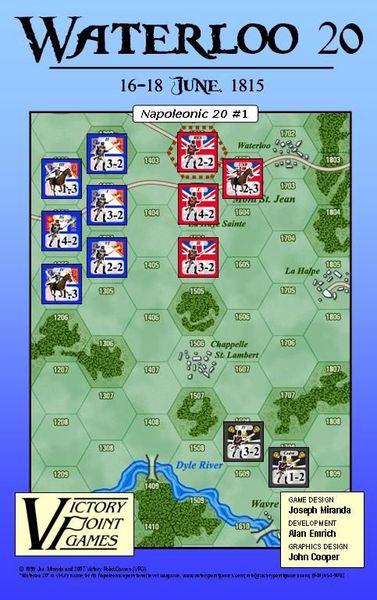Waterloo 20 (2000) Board Game
Waterloo 20 is a board game released in the year 2000, designed by John R. Cooper, John Cooper, and Brian Train. It falls under the Napoleonic and Wargame category, with a focus on the Battle of Waterloo. The game is designed for 1-2 players and has a runtime of approximately 50 minutes. With its hexagon grid and dice rolling mechanics, Waterloo 20 offers a strategic and immersive gameplay experience for players aged 12 and above.
Game Components of Waterloo 20
How To Setup Waterloo 20
Setup involves placing the units on the map according to the scenario instructions. Units are identified by symbols such as “2c” for cavalry units. The initial deployment is critical, as it sets the stage for the entire battle. The game includes specific setup markings for each unit type and corps.
Gameplay Mechanics and Game Objective
Mechanics
Game Objective
The objective is to win the battle by maintaining morale and capturing key objectives. For the French, this means breaking through the Allied lines before the Prussians arrive. For the Allies, it involves holding their positions and wearing down the French forces.
Player Experience
**Waterloo 20** offers a quick and engaging gameplay experience, typically lasting about an hour to an hour and a half. Players need to manage their units effectively, balance morale, and make strategic decisions about when to attack or defend. The game is particularly suited for those new to Napoleonic warfare or wargaming in general, as it simplifies complex historical battles into manageable mechanics.
Pros
Cons
Personal Thoughts on Waterloo 20
**Waterloo 20** is ideal for those unfamiliar with Napoleonic warfare or looking for a quick, strategic wargaming experience. It provides a simplified yet engaging take on the Battle of Waterloo, making it a great introduction to the period. However, it may not satisfy players seeking detailed historical accuracy or complex game mechanics. Overall, it’s a fun and educational game that balances simplicity with strategic depth.
We are supported by our audience. When you purchase through links on our site, we may earn an affiliate commission, at no extra cost for you. Learn more.

